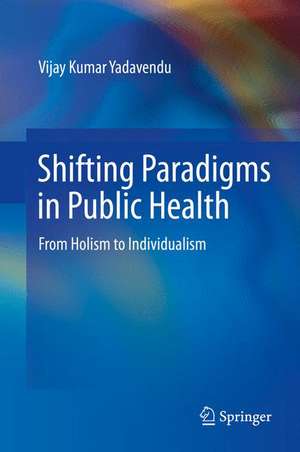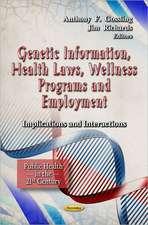Shifting Paradigms in Public Health: From Holism to Individualism
Autor Vijay Kumar Yadavenduen Limba Engleză Hardback – 19 dec 2013
The author shows how positivism and the concept of individualism removed from public health thinking the consideration of historical, social and economic influences that shape disease occurrence and the interventions chosen for a population. He states that the neglect of the multifactorial approach in contemporary public health thought has led to growing health inequalities in both the developed and the developing world. He further suggests that the concept of ‘social capital’ in public health, which is being hailed as a resurgence of holism, is in reality a sophisticated and extended version of individualism.
The author presents the negative public policy consequences and implications of adopting methodological individualism through a discussion on AIDS policies. The book strongly argues for a holistic understanding and the incorporation of a rights perspective in public health to bring elements of social justice and fairness in policy formulations.
| Toate formatele și edițiile | Preț | Express |
|---|---|---|
| Paperback (1) | 699.74 lei 6-8 săpt. | |
| Springer India – 17 sep 2016 | 699.74 lei 6-8 săpt. | |
| Hardback (1) | 706.55 lei 6-8 săpt. | |
| Springer India – 19 dec 2013 | 706.55 lei 6-8 săpt. |
Preț: 706.55 lei
Preț vechi: 743.74 lei
-5% Nou
Puncte Express: 1060
Preț estimativ în valută:
135.22€ • 140.87$ • 112.43£
135.22€ • 140.87$ • 112.43£
Carte tipărită la comandă
Livrare economică 08-22 februarie 25
Preluare comenzi: 021 569.72.76
Specificații
ISBN-13: 9788132216438
ISBN-10: 8132216431
Pagini: 200
Ilustrații: XVII, 203 p.
Dimensiuni: 155 x 235 x 20 mm
Greutate: 0.49 kg
Ediția:2013
Editura: Springer India
Colecția Springer
Locul publicării:New Delhi, India
ISBN-10: 8132216431
Pagini: 200
Ilustrații: XVII, 203 p.
Dimensiuni: 155 x 235 x 20 mm
Greutate: 0.49 kg
Ediția:2013
Editura: Springer India
Colecția Springer
Locul publicării:New Delhi, India
Public țintă
ResearchCuprins
Foreword.- Chapter 1. Introduction: Public Health in Dilemma of Facticity.- PART I: PHILOSOPHICAL HISTORIOGRAPHY OF PUBLIC HEALTH.- Chapter 2. Origins and Orientations of Medicine and Health: A Socio-historical Overview.- Chapter 3. Philosophical Historiography of Epidemiology.- Chapter 4. Epidemiology, Sociology and Psychology of Health and Disease.- PART II: METHODOLOGICAL INDIVIDUALISM IN SOCIAL SCIENCES.- Chapter 5. Ideas and Ideologies of Methodological Individualism in Sociology of Knowledge and Neoliberal Economics.- Chapter 6. Individuation of Psychology.- PART III: STRUCTURE POWER AND THEORY OF HEALTH INEQUALITIES.- Chapter 7. Polemics and Politics of Health Inequalities: A Critique.- Chapter 8. Metaphor of HIV/AIDS Policy: Images and Contexts.- Chapter 9. Epilogue: The Past and Future of Public Health.
Notă biografică
Dr. Vijay Kumar Yadavendu teaches at the Department of Psychology, Magadh University, Bodh-Gaya, India. Following an MA in psychology from Patna University, Patna, he obtained MPhil and PhD degrees at the Centre of Social Medicine and Community Health, School of Social Sciences, Jawaharlal Nehru University, New Delhi. Dr. Yadavendu writes on philosophical historiography of public health and public health ethics and has published research articles in the International Journal of Psychology; Journal of Health and Development; Journal of Health Studies; Economic and Political Weekly; and Current Science; and has co-authored the entry on 'Bioethics, Medicine and Society' in the online edition of Encyclopedia Britannica. Apart from contributing articles in scholarly journals, he has chapters in many edited volumes on health, medicine and ethics.
Textul de pe ultima copertă
This transdisciplinary volume outlines the development of public health paradigms across the ages in a global context and argues that public health has seemingly lost its raison d’être, that is, a population perspective. The older, philosophical approach in public health involved a holistic, population-based understanding that emphasized historicity and interrelatedness to study health and disease in their larger socio-economic and political moorings. A newer tradition, which developed in the late 19th century following the acceptance of the germ theory in medicine, created positivist transitions in epidemiology. In the form of risk factors, a reductionist model of health and disease became pervasive in clinical and molecular epidemiology.
The author shows how positivism and the concept of individualism removed from public health thinking the consideration of historical, social and economic influences that shape disease occurrence and the interventions chosen for a population. He states that the neglect of the multifactorial approach in contemporary public health thought has led to growing health inequalities in both the developed and the developing world. He further suggests that the concept of ‘social capital’ in public health, which is being hailed as a resurgence of holism, is in reality a sophisticated and extended version of individualism.
The author presents the negative public policy consequences and implications of adopting methodological individualism through a discussion on AIDS policies. The book strongly argues for a holistic understanding and the incorporation of a rights perspective in public health to bring elements of social justice and fairness in policy formulations.
The author shows how positivism and the concept of individualism removed from public health thinking the consideration of historical, social and economic influences that shape disease occurrence and the interventions chosen for a population. He states that the neglect of the multifactorial approach in contemporary public health thought has led to growing health inequalities in both the developed and the developing world. He further suggests that the concept of ‘social capital’ in public health, which is being hailed as a resurgence of holism, is in reality a sophisticated and extended version of individualism.
The author presents the negative public policy consequences and implications of adopting methodological individualism through a discussion on AIDS policies. The book strongly argues for a holistic understanding and the incorporation of a rights perspective in public health to bring elements of social justice and fairness in policy formulations.
Caracteristici
Addresses paradigmatic shifts in public health discourse from the ancient to the modern world, with a focus on epidemiology Draws on perspectives from the social sciences, medicine, and history Discusses the shift in public health discourses from a population focus to methodological individualism, with adverse consequences for the population Argues for a rights-based perspective to bring social justice and fairness within public health policy Includes supplementary material: sn.pub/extras












